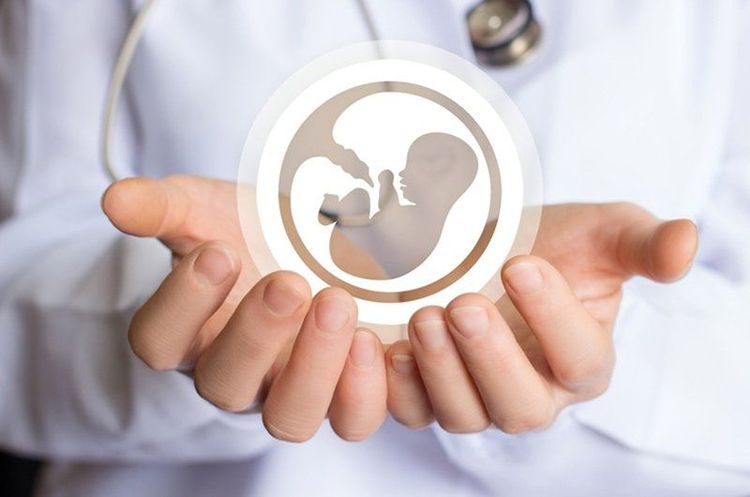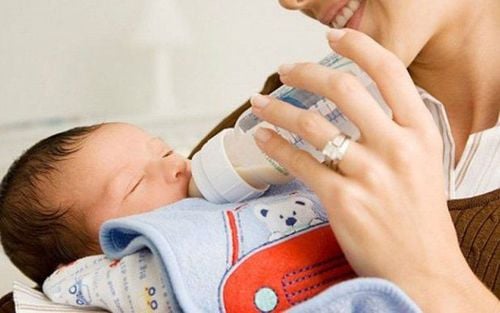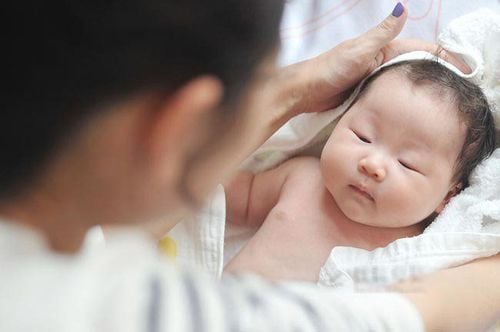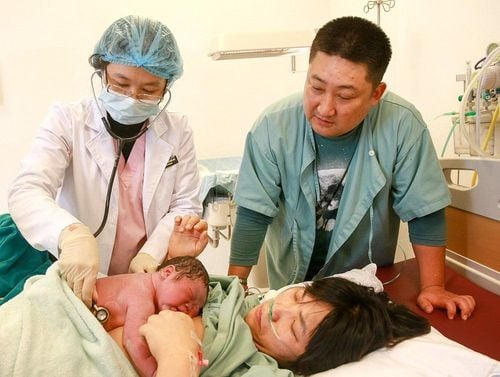This is an automatically translated article.
One of the problems that many mothers wonder is whether it is possible to get pregnant while breastfeeding. How long will it take for the mother's fertility to be restored? And is there a way to prevent pregnancy naturally and effectively during this time. This article will help you understand the possibility of getting pregnant while breastfeeding and how to prevent pregnancy while breastfeeding.
1. Can you get pregnant while breastfeeding?
The answer is absolutely possible, you can get pregnant while breastfeeding. So, if you don't want to have more children yet, it's best to use a reliable method of birth control as soon as you start having sex again after giving birth.
Some studies have shown that the fertility and functioning of the ovaries after pregnancy follow these steps:
The follicles begin to function without ovulation (no chance of pregnancy. ). Menstrual cycle without ovulation (This is not always the case.) Ovulation begins but there is no corpus luteum support (After ovulation, fertilization can occur. During the luteal phase, the lining of the uterus is prepared for implantation as the egg travels down the fallopian tubes and into the uterus.If the lining of the uterus is not sufficiently prepared for implantation, it may occur. will fail.) The capacity of the corpus luteum becomes adequate (Full fertility - at this point, breastfeeding should no longer affect your chances of getting pregnant.) You may have one or (occasionally) more menstrual cycles before ovulation begins. In this case, menstruation occurs during the first stage of fertility recovery - before ovulation returns. Non-ovulatory cycles most commonly occur during the first six months postpartum. For other mothers, the first period usually occurs before ovulation - prolonged periods of amenorrhea will increase the likelihood of ovulation in the first period.
A very small percentage of women will get pregnant on their first postpartum ovulation without going through the postpartum period. This is very rare and is usually associated with reduced breastfeeding.
It's not uncommon for nursing mothers to complain of cyclical cramps or symptoms resembling premenstrual syndrome (symptoms of an upcoming period) - for weeks or even days months before menstruation returns. When this happens, the body may be "preparing" for menstruation to return, but breastfeeding still delays fertility.
The length of time it takes to restore fertility is completely different for each woman. In general, the sooner menstruation returns, the sooner fertility returns.

Mang thai khi đang cho con bú là điều hoàn toàn có thể xảy ra
2. You can prevent pregnancy by breastfeeding.
There are some misconceptions about breastfeeding. The first is not to prevent pregnancy by exclusive breastfeeding. Second, breastfeeding with any amount of milk is effective in preventing pregnancy, regardless of frequency or if menstruation has returned.
The exclusive breastfeeding method of birth control is also known as the amenorrhea lactation method of birth control. Lactation amenorrhea is a natural postpartum infertility that occurs when a woman does not have a period due to breastfeeding. Many mothers receive mixed information on the topic of breastfeeding and fertility.
Exclusive breastfeeding has in fact proven to be an excellent form of birth control, but there are certain criteria that must be met for breastfeeding to be used effectively.
When breastfeeding, a woman's body may not ovulate for several months (or even longer) after giving birth, especially if you are exclusively breastfeeding.
The production of breast milk that delays the return of menstruation is the basis for a contraceptive technique known as the lactating amenorrhea method (LAM).
But to use this method properly, you must meet certain criteria:
Children under 6 months old. You must breastfeed at least every four hours during the day and every six hours at night. When using amenorrhea breastfeeding, you must not use any food source for your baby other than direct breastfeeding. (The use of formula instead of breast-feeding and solid foods also makes this method less effective.) Breastfeeding amenorrhoea is reported to be 98% effective in the first six months postpartum. when you meet exactly these conditions. But the effectiveness rate drops as the baby gets older, such as when he starts to eat solids, or feeds less often as he begins to sleep more during the night.
Remember that you can start ovulating again at any time without knowing it. That means you can get pregnant before your first period after giving birth. So don't wait until your period to find a reliable birth control method.
If you want to use breastfeeding for natural family planning, talk to your healthcare provider or lactation consultant about breastfeeding amenorrhea, ideally before you give birth.
3. How can the effectiveness of contraception be maximized with amenorrhea breastfeeding?
The time it takes to become fertile again varies from woman to woman and depends on breastfeeding patterns and how sensitive the mother's body is to hormones involved in lactation.
Breastfeeding frequency and total breastfeeding time per 24 hours were the factors most closely associated with return of fertility. The mother is more likely to become fertile again if the frequency and/or duration of breastfeeding is reduced, especially if the change is sudden.
In some populations, research has shown that night feeding slows fertility again. One study found that mothers who separate (but express milk to provide 100% of their breast milk) have a higher risk of becoming pregnant (5.2%) during the first 6 months.
The introduction of solid foods can also be a factor in increasing fertility again. Once the baby starts solids (if the mother's period hasn't returned), the natural amenorrhea can be prolonged by breastfeeding the baby before introducing solids, starting solids gradually and without restriction. dinking mother milk.

Các mẹ có thể tối đa hóa hiệu quả tránh thai bằng phương pháp cho bú vô kinh
You can get better results by practicing breastfeeding according to the following model:
Keep the baby close to the mother to increase the chances of breastfeeding Breastfeed on demand (day and night) Use breastfeeding to calm baby's fussing Breastfeeding in a lying down position at night (for mother and baby's comfort) Don't use bottles or pacifiers If you practice breastfeeding this way The chance of pregnancy is practically zero during the first trimester, less than 2% between 3 and 6 months, and about 6% after 6 months (assuming the mother's periods have not returned). The average time to menarche was 14.6 months. Mothers whose periods return early tend not to ovulate during the first few cycles. Mothers whose periods return later are more likely to ovulate before their first period.
4. Do you need to wean to get pregnant?
The answer is no. If you're still in the fertility recovery phase (as discussed above), breastfeeding can affect implantation success. After successful implantation, breastfeeding should not interfere with a healthy pregnancy. If your periods are back and regular, it's likely that breastfeeding is no longer affecting your fertility.
Sudden changes in the pattern of breastfeeding tend to cause fertility to return more quickly (e.g. abruptly canceling a nursing session, rather than gradually reducing the duration of breastfeeding on that session) ) — even if you continue to breastfeed a lot — this is why many mothers experience a return to fertility when their baby sleeps through the night or starts eating solid foods. If you decide to change your breastfeeding pattern, the time of day that you make the change (for example, cutting out or shortening nighttime feedings instead of daytime feedings) will not makes a lot of difference. Current research indicates that breastfeeding frequency and total breastfeeding duration per 24 hours are the most important factors, not the time of day.
Some mothers cannot get pregnant while breastfeeding, but this is not common. Many mothers wonder if breastfeeding affects the reliability of a pregnancy test. The answer is no - pregnancy tests measure the amount of hCG hormone in blood or urine, and hCG levels are not affected by breastfeeding. The developing placenta begins to release hCG upon implantation; Usually, pregnancy can be detected with a pregnancy test within 7-14 days after the implantation.
Please dial HOTLINE for more information or register for an appointment HERE. Download MyVinmec app to make appointments faster and to manage your bookings easily.
Reference source: babycenter.com













